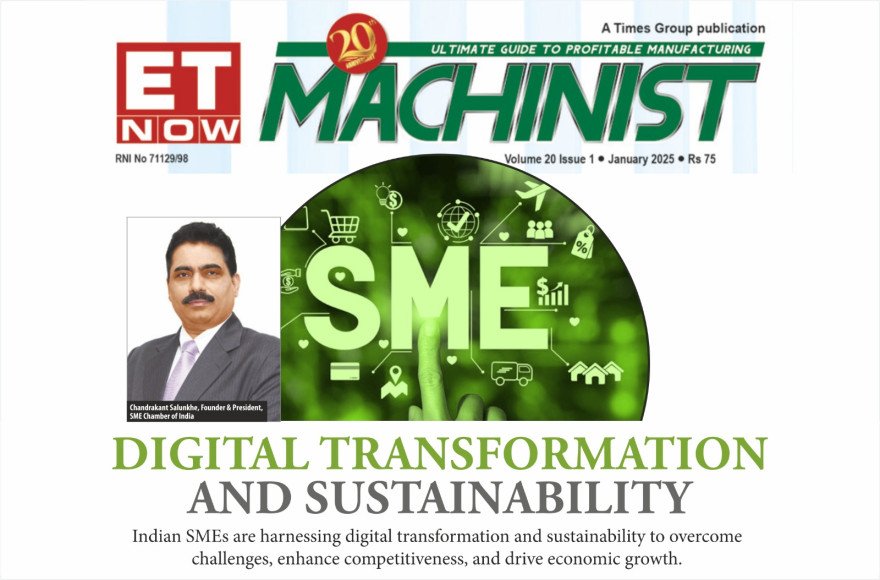Share

Digital transformation and sustainability empower Indian SMEs to overcome challenges, enhance competitiveness, and expand into global markets, driving economic growth and promoting innovation across industries and geographies
Chandrakant Salunkhe – Founder & President, SME Chamber of India
Indian SMEs are harnessing digital transformation and sustainability to overcome challenges, enhance competitiveness, and drive economic growth.
Between 2000 and 2019, Small and Medium Enterprises (SMEs) in India faced significant challenges in connecting with clients and customers due to limited digital awareness. However, the pandemic acted as a turning point, pushing entrepreneurs to explore digital platforms for branding, marketing, and communication. The adoption of digitalisation enabled them to build stronger connections with stakeholders, unlocking new growth opportunities.
Despite these advances, SMEs have long struggled with barriers like limited access to finance, insufficient market information, low productivity, and fierce competition with larger firms. Challenges such as regulatory compliance, supply chain constraints, and technological gaps have often hindered their growth and competitiveness.
In recent years, digital transformation and sustainability have become important forces shaping the SME ecosystem. Digital transformation refers to integrating advanced technologies into business operations, fundamentally altering how companies operate and deliver value. For SMEs, this shift is not just a choice but a necessity in today’s competitive and evolving digital world.
By adopting digital tools and technologies, SMEs can streamline operations, enhance customer experiences, and expand into new markets. From improving operational efficiency to reducing costs and boosting productivity, the transition toward digitalisation offers immense benefits. Entrepreneurs are leveraging digital platforms to reach global markets, harnessing the power of e-commerce, and creating branding opportunities across various media and portals.
Sustainability, meanwhile, focuses on meeting present-day needs without compromising the future. For SMEs, adopting sustainable practices is no longer about corporate responsibility— it’s a business imperative. Sustainable strategies lead to cost savings, enhance brand reputation, and ensure regulatory compliance. Measures like reducing waste and energy consumption not only lower operational costs but also provide a competitive edge in the market.
Yet, challenges persist. Securing finance remains a significant hurdle, as many lending institutions perceive SMEs as high-risk borrowers. Limited access to affordable funding restricts investments in digital technologies and sustainable practices. Compliance with regulatory frameworks also adds complexity, with SMEs often lacking the resources to navigate these requirements effectively. Additionally, workforce issues, including attracting and retaining skilled talent, exacerbate the situation. Existing employees often require upskilling to adapt to new digital tools and practices, creating additional strain on limited resources.
Despite these challenges, the potential opportunities for SMEs are vast. Export prospects have expanded, with digital platforms enabling access to global markets. Government initiatives, such as the Digital India programme and support for Sustainable Development Goals (SDGs), provide vital resources, financial aid, and training to help SMEs adopt modern practices.
Emerging technologies such as artificial intelligence, blockchain, and the Internet of Things (IoT) also present groundbreaking possibilities. These tools can enhance supply chain management, improve customer interactions, and increase operational efficiency. By embracing these innovations, SMEs can adapt to changing market dynamics and secure long-term growth.
The SME sector is a cornerstone of India’s economic fabric, driving exports, employment generation, and entrepreneurship. It plays an important role in transforming unskilled labour into a skilled workforce and promoting industrialisation in Tier 2 and Tier 3 cities. With digital transformation and sustainability at the forefront, SMEs are equipped to contribute significantly to India’s journey toward becoming a global manufacturing hub and achieving the vision of “Viksit Bharat.”
The future of Indian SMEs lies in overcoming challenges, leveraging opportunities, and evolving into resilient, innovative enterprises that drive economic progress and solidify India’s position as a leading global economy.
Source: THE MACHINIST. https://www.themachinist.in/
Related Posts
SEARCH SMECONNECT-DESK
RECENT POST
- Piyush Goyal meets startup founders in Delhi, weeks after questioning lack of innovation by many new cos.
- More than 28,000 Startups shut shop in last two years
- MSME’s moving from traditional lenders to capital markets
- SEBI picks 9 audit firms to probe corporate fraud
- Is cybersquatting threatening your brand?








